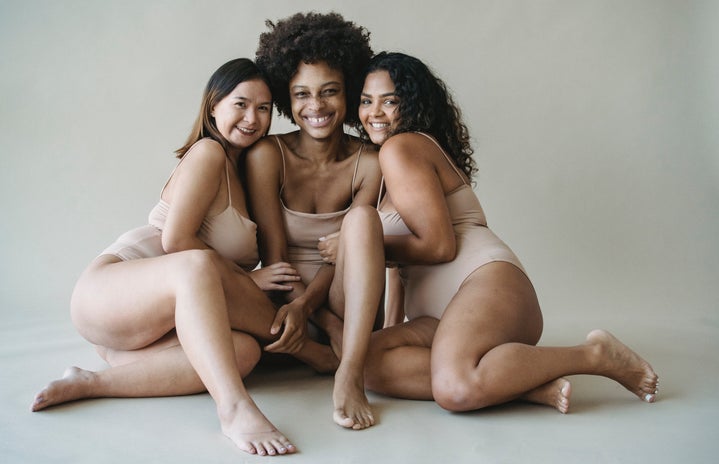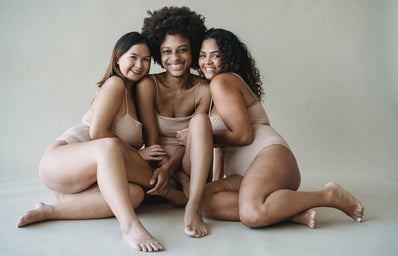One of my biggest pet peeves as a fat person is when I’m complaining about my weight and someone at least 40 pounds lighter responds with, “Stop! You’re so pretty.”
I never said that I wasn’t…but I guess I appreciate the compliment.
That comment naturally brings up a series of questions that send me into a downward spiral.
When people look at me, are they thinking “Look at that whale?”
Do I look fatter to other people than I do in my head?
Do people think that I’m ugly because I’m fat?
Although the first two are questions that can only be answered by a mind reader, the third one I can answer.
Yes.
There are people in this world who look at you, see that you’re not 120 pounds, and decide that you’re not pretty.
Is that fair? No. Is it becoming more and more common? Sadly, yes.
Before we get further into this conversation, there’s something that we need to establish.
What does it mean to be fat? Being fat means a lot of different things; I used to say that you were actually fat if you couldn’t buy pants at a thrift store. I’ve heard people say that you’re fat if your thighs rub together when you walk. Then there are the people who decide on a certain size (A pretty difficult ultimatum considering that no two brands’ sizes are the same).
This isn’t about what the threshold is for what’s considered fat. I could say that I wear size 18 jeans and a universal extra large t-shirt, and there would be some who would say that I shouldn’t be talking until I’m a size 24. Whether or not you know my weight doesn’t invalidate my opinion; these are simply the observations of someone who considered themselves fat since they hit puberty.
Body positivity and the body positivity movement are no longer trending. It is no longer popular to accept every size and shape. The demand for inclusiveness in media such as clothing trends and fashion shows is over. The body positivity movement is dead.
From the perspective of a fat girl
The realization that the body positivity movement of the 2010s is no longer trending wasn’t something that magically dawned on me one day. I didn’t sit up in bed one morning and think, “Being fat is no longer cool!”
Well, being fat was never cool, not even when uplifting all different body types was everywhere.
This realization was more of a mindset that built up over time. It came from scrolling through social media sites like TikTok and Instagram and seeing the comment section of stunning women with tiny waists. The comment sections are full of people drooling over their bodies and constantly complimenting their figures. However, when examining the comment section of larger women, those comments are nowhere to be seen.
Growing up bigger, I knew that no one would ever compliment my body like that. When the body positivity movement was at its peak, I thought this was our society changing for the better. Every woman would be celebrated and called beautiful because they were. It seems to be it was simply a trend of the time.
Now it seems that every new fashion trend and the most popular influencers are shrinking in size. Current clothing trends such as micro skirts and low-waisted jeans weren’t made for bigger body types. And not just because these trends never had plus-size girls in mind. Also, brands only make clothing bigger, without altering it anyway to be more flattering on different body types.
Inclusivity is No Longer trending
Trending nostalgia seems to be a large factor in the slow death of inclusivity.
There’s a demand for the return of past eras, and “remembering the good old days.” Particularly, the 2000s seem to be trending at the moment, with it’s fashion coming back too. Particularly Gen Z and millennials romanticize this time, claiming that movies, music, and fashion were just so much better.
While it’s okay to reminisce about a past time, there’s something that past eras significantly lacked. Inclusivity. Tall, skinny, white women were built up as beauty icons, only to be torn down the next day if an unflattering picture was taken of them.
The idea was that being anywhere north of size eight was the end of the world, and skinny must be achieved by any means possible. Disordered eating, diet pills, and weight loss shows were just some of the trends that marked this time.
Instead of rebuking these harmful trends, it’s romanticized as a better time that we must get back to. In turn, the body positivity trend is labeled as a toxic mistake that promotes unhealthy lifestyles.
The Rise of Ozempic
Of course, low-waisted jeans being back didn’t singlehandedly didn’t end the movement. The rising popularity of quick weight loss solutions has made significant contributions.
The Internet has no issue telling someone exactly what “needs fixing” with their body. It’s pushing the mindset that you’re one fix away from being a whole person. This is peddled through diet trends, such as the newly trending carnivore diet, gym regimes, or surgeries. “Mommy makeover” might have a cute little name, but it has deeper repercussions that women’s postpartum bodies are something that needs to be fixed.
One of the most popular culprits is Ozempic. Originally it was approved to treat type 2 diabetes, but has been gaining increasing popularity as a magical weight loss drug. Dani Blum writes in a New York Times Article titled, “What is Ozempic and Why Is It Getting So Much Attention?”, and says, “On TikTok, the hashtag #Ozempic has been viewed over 273 million times, with people alternatively expressing shock over their supposed medication-induced weight loss.”
Many celebrities have lost a miraculous amount of weight and are alleged to be using it as well. The Kardashians are the most known for allegedly using Ozempic to lose weight, but they have denied using it. Although, other celebrities have used it, including Rebel Wilson, who at the height of her popularity played the character nicknamed “Fat Amy”, and she has admitted to using Ozempic to help her lose 80 pounds.
Formerly plus-sized women who have lost a significant amount of weight are praised for their “stunning transformations”. The trending influencers and up-and-coming celebrities are either getting skinnier or are already skinny. There’s an erasure of these safe figures, who proudly declared themselves as a representation of bigger girls.
Where Do we go from here?
If the body positivity movement is dead, then what happens to us bigger girls who are left in the dust?
First of all, trends come in at a seemingly faster rate. If body positivity is truly just a trend, it will eventually cycle back around. The gap in representation will be filled, and at least for a short time, there will be more inclusivity again.
In the meantime, there lies the danger of an us versus them mindset. This idea that there are two camps and you have to pick a side only prevents any hope of change. It also creates a victim mindset and targets another group of women as the enemy for simply existing.
Maybe, declaring the body positivity movement as dead was a little premature. Although it isn’t trending, there are still people out there promoting inclusiveness and diversity.
TikTok creator @jennifer.buckingham is a prime example of supporting body positivity. On her TikTok, she talks about motherhood, food, and traveling, and she promotes plus-size fashion. She’s created a spot of inclusion by celebrating her body while also putting her spins on fashion trends.
Plus-size creators like her who bring positivity and diversity to the internet are what keep the body positivity movement beating, even if it’s no longer on the trending tab.
Like Jennifer, we can make ourselves a place of support where the media has failed us in our everyday lives. Everyone struggles with body image in some way at some point in their life, which is exactly why we need to build each other up. There are no specific rules to how we can be the best support systems for each other, but there are two that I always follow:
- I will never judge how much you eat or what you eat (because sometimes it’s harder to eat in front of other women than in front of men)
- If you’re out with friends and someone wants ice cream, then we’re all getting ice cream.


